PERSPECTIVE: 21-year-old Nour Alshaer tells us about what life is like in the Gaza Strip, Palestine, under military occupation by Israeli forces.
She was studying medicine in the U.S. but returned to Gaza in the summer of 2020 to be with her family during the Covid-19 pandemic, and has been there ever since.
Speaking to Mothership, Nour shares how her family has been affected by the ongoing attacks and how it has been the worst that she has experienced yet.
As told to Kayla Wong and Matthias Ang by Nour Alshaer
I've been given the identity of the oppressed since the moment I was born.
The year I was born, my house was bombed. Luckily, we made it and are still alive.
Shortage of food, water and electricity
Since then, we've lived under a blockade, and we're always under attacks.
Israel has been putting us literally on a diet, controlling how much food comes into the Strip (a blockade has been placed on Gaza by Israel and Egypt since Hamas took charge there in 2007).
Luckily for my family, we set aside some food because we were preparing for Eid, and were supposed to celebrate. But if the attacks last longer, then we're going to start running out of food.
We have some strategy for conserving food in the meantime because obviously, this isn't the first time that we're experiencing this.
For one thing, we don't really have that much appetite right now, so we don't really eat much currently.
Our water is polluted, and our electricity is limited.
We used to have eight to 12 hours of electricity before the last attack, but now it's like a maximum of three to four hours, which is expected to go to zero very soon because we're running out of fuel. Israel has closed their border and they're not allowing any fuel to come in.
For water, we are fortunate to have a big tank of water that we're using, which could also run out at some point. But other families are less lucky because they have smaller tanks and they depend on trucks roaming around the city to sell water tanks.
Since the attacks started last week, we have been trapped in our own houses and are not able to leave. There's nowhere safe around the whole Gaza Strip.
We obviously don't have any bomb shelters, so we only seek safety in our own houses, which are not safe and can collapse when bombed. A lot of houses have been bombed without warning, killing more than 200 people in the strip so far.
It's anything but safe right now, and there's a lot of grief.
Everyone is just trying to support one another through social media, fax and phone calls. I’m always seeing people post about family members they lost.
In fact, I lost a cousin who was pregnant with her daughter. Another cousin is now still in the ICU in critical condition.
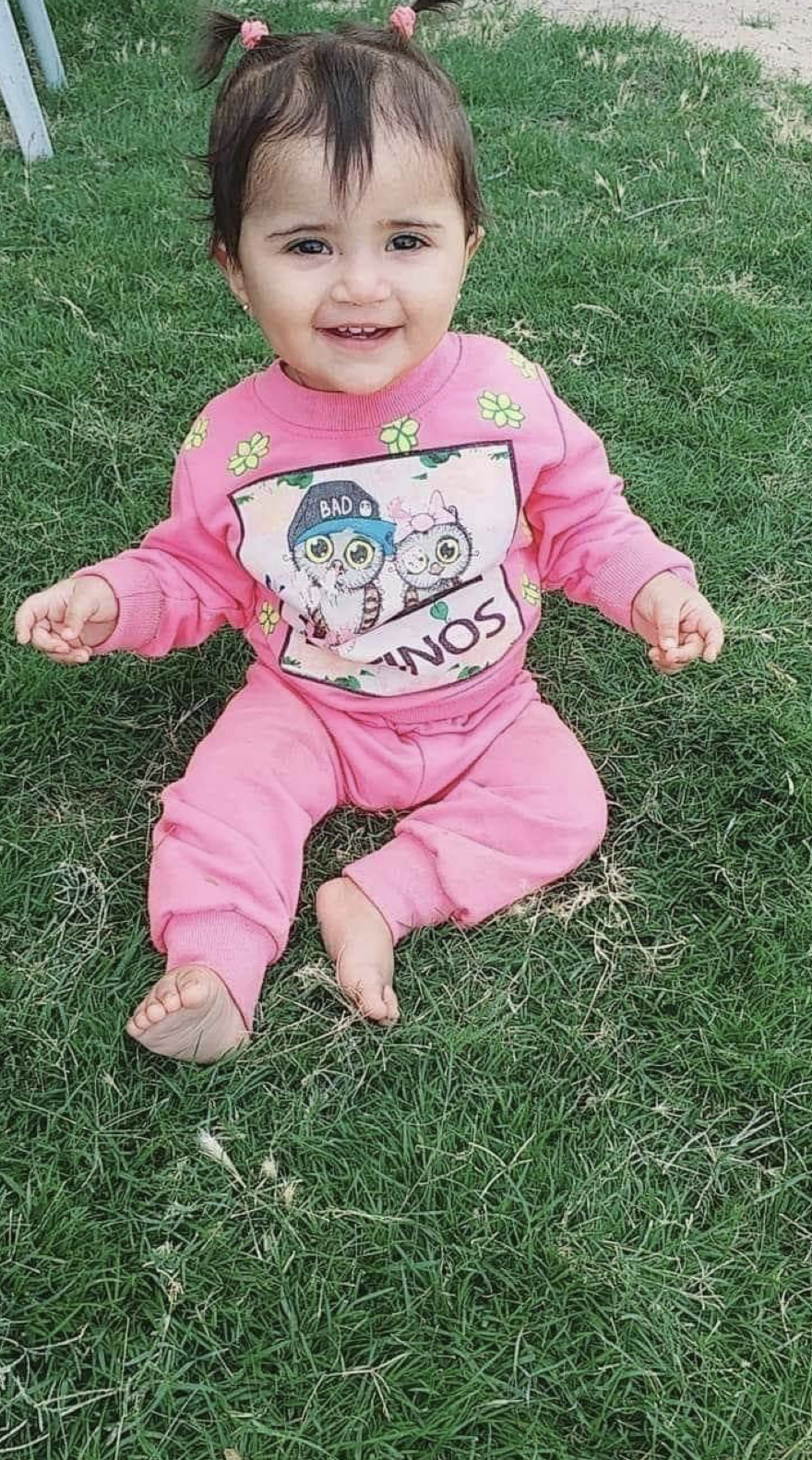 My cousin, who was pregnant at the time, died along with her baby daughter. (Photo courtesy of Nour Alshaer)
My cousin, who was pregnant at the time, died along with her baby daughter. (Photo courtesy of Nour Alshaer)
People who lost their family reached out and asked if there's anything they could do as well.
We don't get the privilege to grieve properly when our loved ones die
We learnt about my cousin’s death through media reports.
Before the airstrikes, we were just in our house, gathered in one room, talking about the situation. My family and I try to stay in one room so that whatever happens happens to all of us at once. Nobody has to grieve for another person if we lose them.
We were talking, and all of a sudden, our house was shaking and the windows almost broke on us. There are ongoing bombings so far, but that was really, really loud, so we knew it was in our neighbourhood.
When we heard the ambulances, we knew there were some casualties, but we had to wait for the media to tell us whom we might have lost. We knew it was going to be someone we cared about because it was in our neighbourhood, but we did not expect it to be a member of the family.
About 20 minutes later, the media reported her name, and that's how we knew that she died. Before that, another bombing happened at a place where my best friend lived, so I was really worried about her, and had to wait for the media to tell us about her status.
My best friend made it, but my cousin didn't.
We didn't have the privilege of giving her the funeral she deserves, or even have time to grieve, because we're still so worried about our own safety.
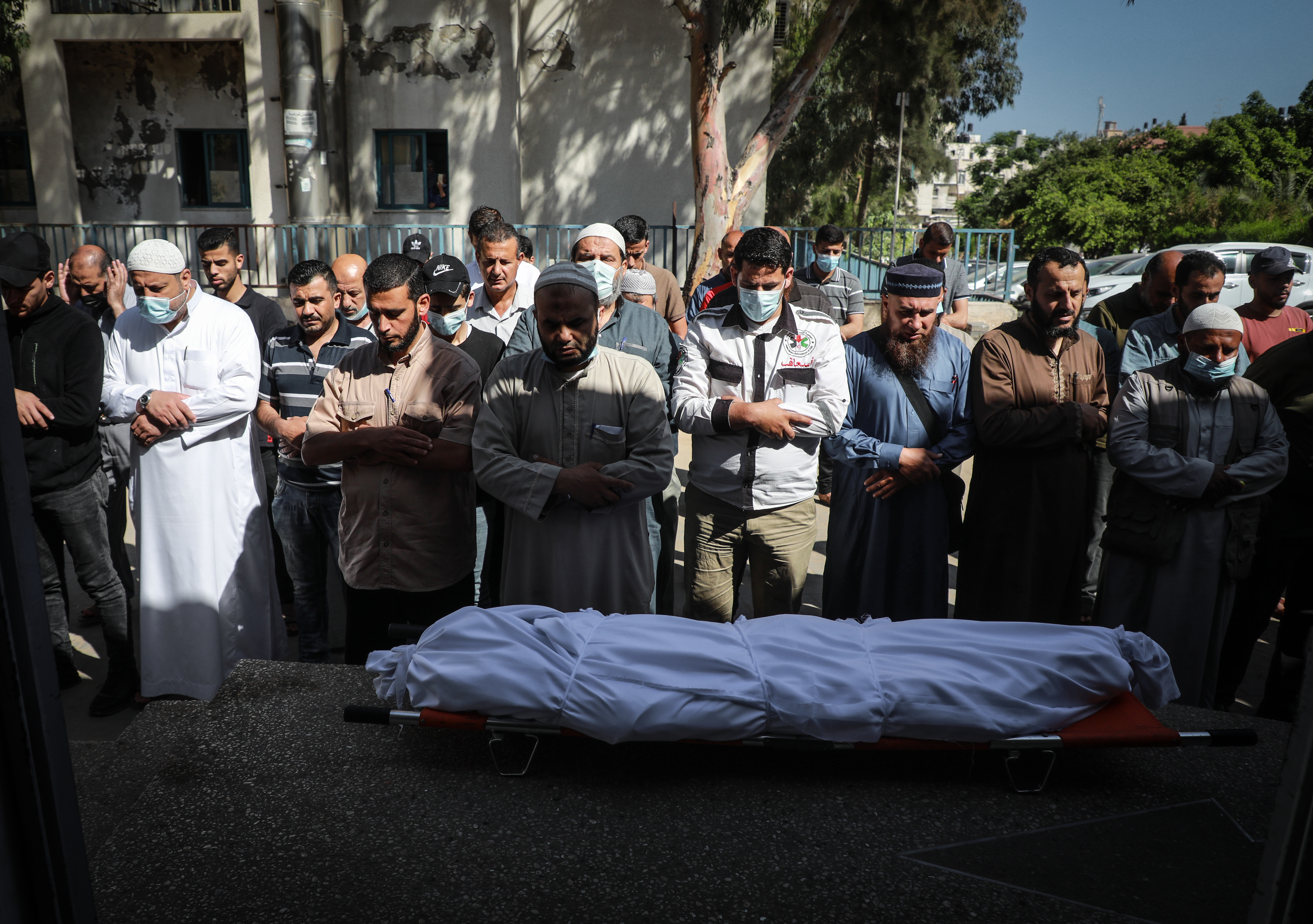 Palestinians mourn the death of 19-year-old Mahmoud Shtawi on May 19 in Gaza City. (Photo via Getty Images)
Palestinians mourn the death of 19-year-old Mahmoud Shtawi on May 19 in Gaza City. (Photo via Getty Images)
Thankful we're still alive in the morning
We have no time to think about our mental health as we’re now doing our best to keep our physical bodies alive, which is not even something that we can "try" to do because there's literally nothing we can do about that, except staying at home and praying for the best.
We get more attacks during the nighttime. They're like 70 airstrikes per second, nonstop.
https://www.instagram.com/p/COxcY-sAFmQ/
At night, we're all like preparing ourselves to die at any second, saying our last prayers and asking people for forgiveness.
We don't wake up to "good morning", we wake up to "God, we're still alive". And each time we wake up, we can't believe we're still alive.
Most people in the Gaza Strip don't really sleep during the night. We're actually awake most of the time, due to loud bombings.
We just steal minutes, and maybe a few hours of sleep during the day sometimes, on and off. This morning, I tried to have two hours of sleep, but I woke up to very loud bombings in the same neighbourhood.
We think it's deliberate that Israel is bombing during the nighttime, when we are supposed to sleep.
We are scared for our loved ones more than we're scared for ourselves.
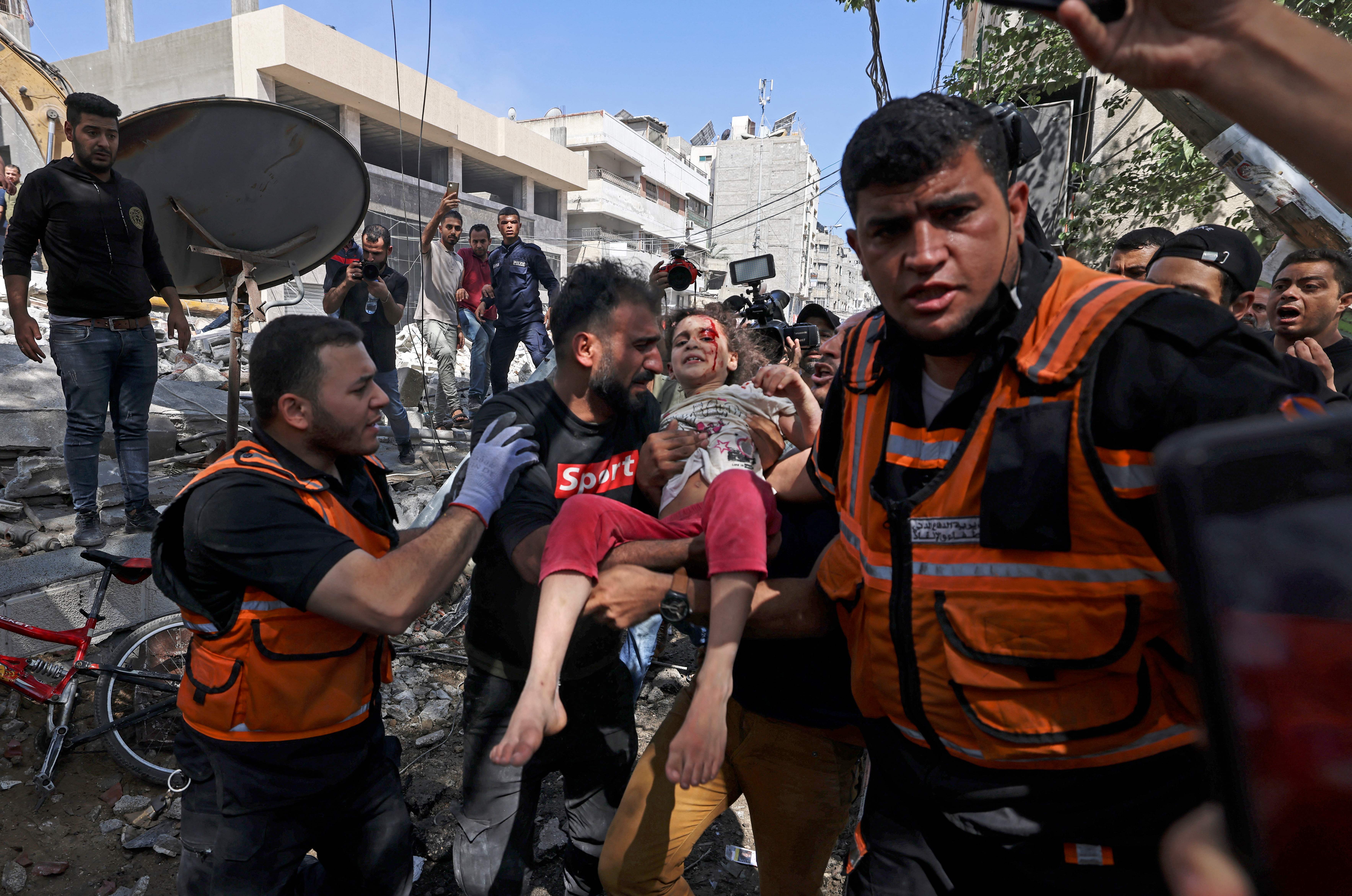 Palestinian Suzy Eshkuntana is carried by paramedics to an ambulance after being pulled out of the rubble of a destroyed building in Gaza City's Rimal residential district on May 16. Suzy and her father Ryad were the only survivors in their family after her mother and siblings were killed in an airstrike that hit their home. (Photo by Mahmud Hams/AFP via Getty Images)
Palestinian Suzy Eshkuntana is carried by paramedics to an ambulance after being pulled out of the rubble of a destroyed building in Gaza City's Rimal residential district on May 16. Suzy and her father Ryad were the only survivors in their family after her mother and siblings were killed in an airstrike that hit their home. (Photo by Mahmud Hams/AFP via Getty Images)
Forgot about the pandemic
We kind of forgot that there's a whole pandemic going on.
We don't have the privilege to worry about the pandemic right now as our lives are at stake. And just a few days ago (May 17), Israel bombed the only place where we could actually get tested for Covid-19.
Lack of medical treatment in the Strip
We are extremely under-equipped, and we have very, very, very limited resources inside the Strip, one of which is the complete lack of any treatment for cancer patients here.
People can be denied the permits to visit hospitals in the West Bank, or they can be asked to go there without family members, including little children without their parents.
I find this to be a very cruel reality. That's why I decided to pursue a medical track and become an oncologist, so we can build a system inside the strip to help cancer patients.
And that's actually the reality of most people in the Gaza Strip and the whole of Palestine.
If you ask them about their careers and what they want to do in the future, you usually find them wanting some sort of career that would take their reality to a better place.
Any sort of resistance has been met with anger
So for the historic context: One thing that needs to be explained is that this is not the result of a religious conflict that's been going on for thousands of years between Muslims and Jews.
This is about military occupation that started in 1948, and is still ongoing.
The Palestinians have always been called terrorists or anti-semitic.
But criticising the Israeli government is not anti-semitic. We are simply calling them out for their overly-aggressive retaliation to us for our resistance, and that should not be labelled as anti-semitic.
Any sort of resistance by the oppressed people has been met with anger.
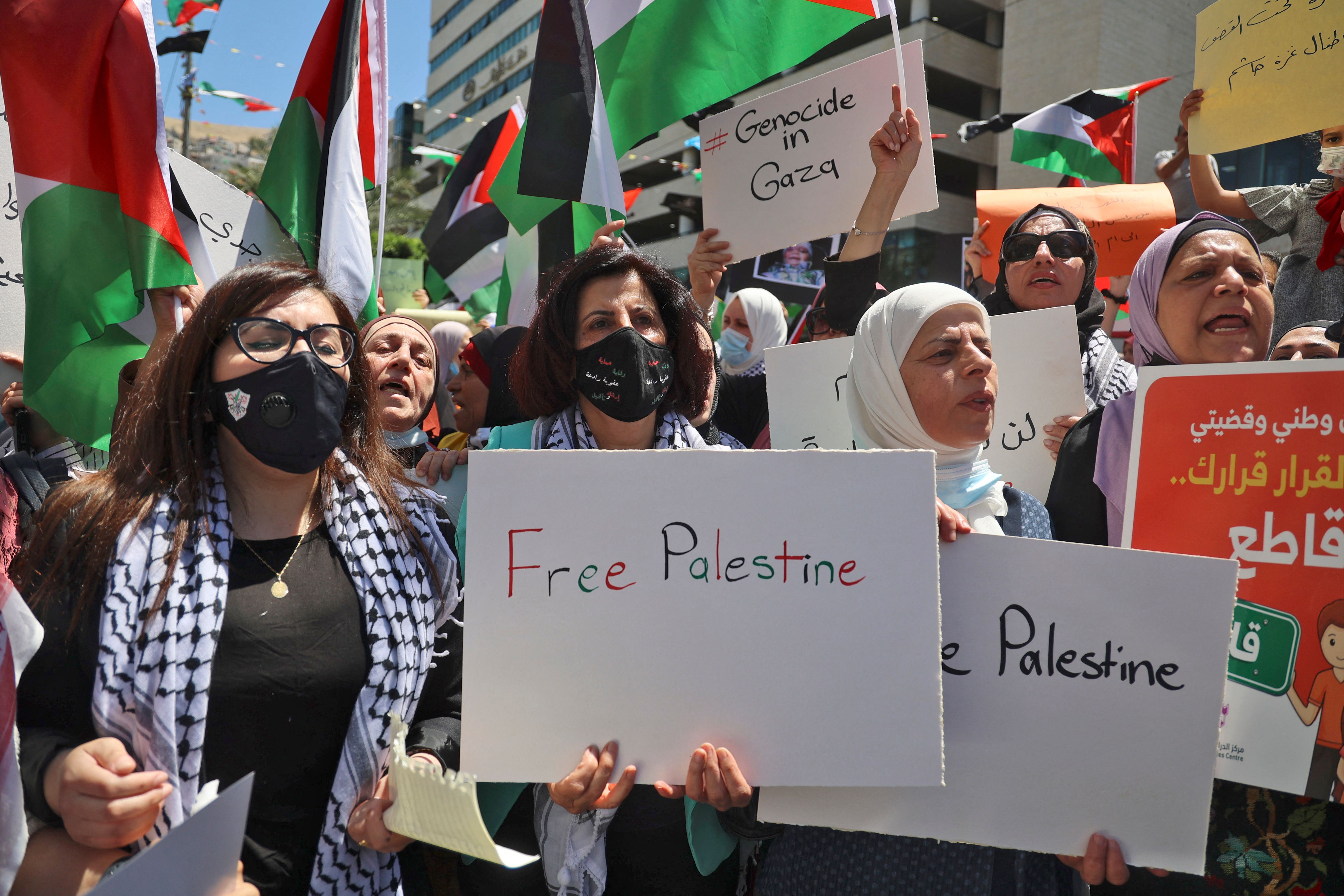 Palestinian women wave their national flags and shout slogans during a protest against Israel's occupation of Palestinian territories and its air campaign on the Gaza Strip, in the occupied West Bank city of Nablus, on May 19 (Photo by Jaafar Ashtiyeh/AFP via Getty Images)
Palestinian women wave their national flags and shout slogans during a protest against Israel's occupation of Palestinian territories and its air campaign on the Gaza Strip, in the occupied West Bank city of Nablus, on May 19 (Photo by Jaafar Ashtiyeh/AFP via Getty Images)
This is a group that has been living under a blockade for 14 years now since 2007, and has chosen to do some sort of resistance. It doesn’t matter if it’s peaceful or violent, whatever resistance Palestinians have done has always been met with anger.
Take the BDS (Boycott, Divestment, Sanctions) movement for instance. It's only calling for political and economic pressure on the Israeli state, but it has been called illegal by so many countries, which say it's anti-semitic.
Other forms of movements, like women and feminists asking for equal rights for women, are also met with anger, and somehow people have a problem with these, and don’t want them to last.
We’ve always been branded as terrorists
If the only reason Israel is attacking people and killing innocent children is Hamas, well, then what about what's happening in Israel?
Israeli Palestinian citizens there are second-class citizens. Israeli settlers are literally marking their houses so that they can be attacked by other Israeli settlers inside their houses. They are supposed to be Israeli citizens with equal rights, also protected by the Israeli police, but look at what’s happening now.
Same thing in the West Bank too, Palestinians have been killed. Children have been killed and abducted inside the West Bank.
This conversation is much bigger than just Hamas. This is a conversation about the military occupation of Palestine. This is about the apartheid system, and the ethnically-motivated violence.
The United Nations (UN) has accused Israel of imposing an "apartheid regime" of racial discrimination on Palestinians, Reuters reported.
Human Rights Watch said in a report that Israel has a policy "to maintain the domination of Jewish Israelis over Palestinians", including those who are its citizens (Israeli-Arabs). Israel has rejected the claim.
Apartheid constitutes state-sanctioned racial discrimination, and is considered a crime against humanity, according the UN.
When I visited Palestine years ago, I flew in thru Ben Gurion in Tel Aviv. Omw out, I lined up behind other travelers so an IDF soldier could check my passport & interrogate me. A sticker w the number 1-6 was then stuck all over u/ur luggage based on level of security threat. 1/
— Radio Free Amanda 余美娜 (@catcontentonly) May 19, 2021
Can't protect ourselves as there are no bomb shelters
Many international media have always been calling us terrorists and the oppressor, but how can we be the oppressor when another state is attacking us?
The Western media has always been calling all the attacks on Gaza and the Palestinians "self-defence", which doesn’t make sense because this is a powerful state attacking a stateless population. I can’t emphasise this enough.
We literally can’t do anything, and we don’t have any bomb shelters to go to. This is not an equal equation. Calling for peace from both sides is also another misconception because this is not a "both sides" kind of conflict, it’s attacks on the Palestinians.
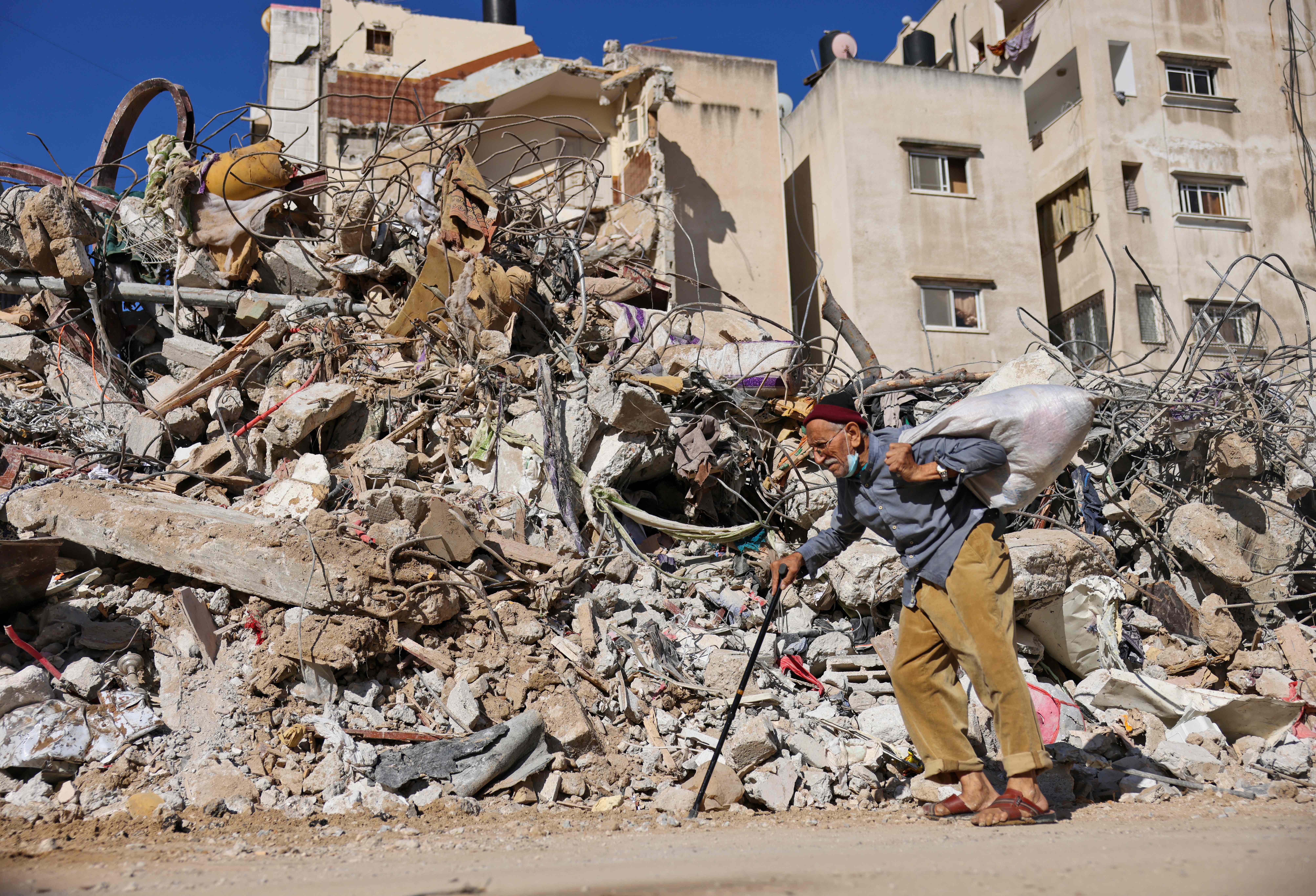 Palestinian elderly man walks past a building destroyed by Israeli bombardment in Gaza City, on May 19. (Photo by Mohammed Abed/AFP via Getty Images)
Palestinian elderly man walks past a building destroyed by Israeli bombardment in Gaza City, on May 19. (Photo by Mohammed Abed/AFP via Getty Images)
The language used has been very biased as well. They’re always talking about rockets from the Gaza Strip, but at the same time, more than 200 people have died in Gaza. How did they die? Why was Israeli never condemned for the airstrikes, which killed way more people?
I’m not saying that we should be seen as numbers, but those numbers tell something.
If you compare the death toll between the Israeli and Palestinian side, you should already know who’s the oppressed and who’s the oppressor. It should be very clear now.
Social media has allowed us to tell our stories
Israel has been controlling the narrative for so long. Young Palestinians are now using social media as a platform to tell their stories, because this is the most we can do inside the Strip right now.
https://www.instagram.com/p/CO2__jnAOKC/
We are trying to show the international community what Israel is doing, and expose the war crimes that Israel is doing. In the past, the Internet was not that prevalent, and this is the biggest difference between our generation and the previous generation -- how we are utilising it as a tool for resistance.
I just want to see everyone living peacefully together regardless of religion
This two-state solution has not been working because the Israeli government have not been following the rules that they actually agreed and signed for.
The two-state solution has been proposed for so long, but Israel still hasn’t stopped annexations on the West Bank, which is illegal by international law and according to the two-state solution. The blockade in the Gaza Strip is illegal too.
The only solution will just be people living equally together, like people of all religions -- Muslims, Jews and Christians -- living together peacefully with equal rights, and without any control by another gun due to the imbalance in power dynamics.
This is unlike what’s happening in Israel now, giving Israeli-Palestinians citizenship but still treating them like second-class citizens, and not protecting them from settlers. That’s not equality, and that’s not the solution.
The Israeli government is much greater and way more powerful than the Palestinian government, and they want the whole piece of land. From past behaviours in recent years, they are unlikely to accept the two-state solution.
It’s not complicated to understand
As Desmond Tutu said, “If you are neutral in situations of injustice, you have chosen the side of the oppressor.”
It’s not "complicated".
While we certainly appreciate people taking to the streets on our behalf, which is a sight that’s very refreshing, that’s not going to change the reality of the policies, or the reality of the military occupation.
Solidarity protests for Palestine have erupted worldwide this week from NYC to Istanbul. More than 50 Palestinians have reportedly been killed since Israeli airstrikes began following the latest series of aggressions toward Palestinians, according to Gaza health officials. pic.twitter.com/SdhuUlV0ac
— NowThis (@nowthisnews) May 13, 2021
So people have to keep pushing their representatives and their governments to actually make a change in how they view this issue. After these attacks, the survivors can’t ever go back to zero, or the starting line, it will only go back to negative.
Because the survivors will have lost family members and loved ones, and infrastructure has already been destroyed.
We want to free Palestine, and by that I mean we want to live with dignity, without worrying about our lives. And we want the blockade on Gaza to be lifted, and the racial discrimination to stop.
Top image by Nour Alshaer/Instagram & Ashraf Amra/Anadolu via Getty Images
If you like what you read, follow us on Facebook, Instagram, Twitter and Telegram to get the latest updates.
